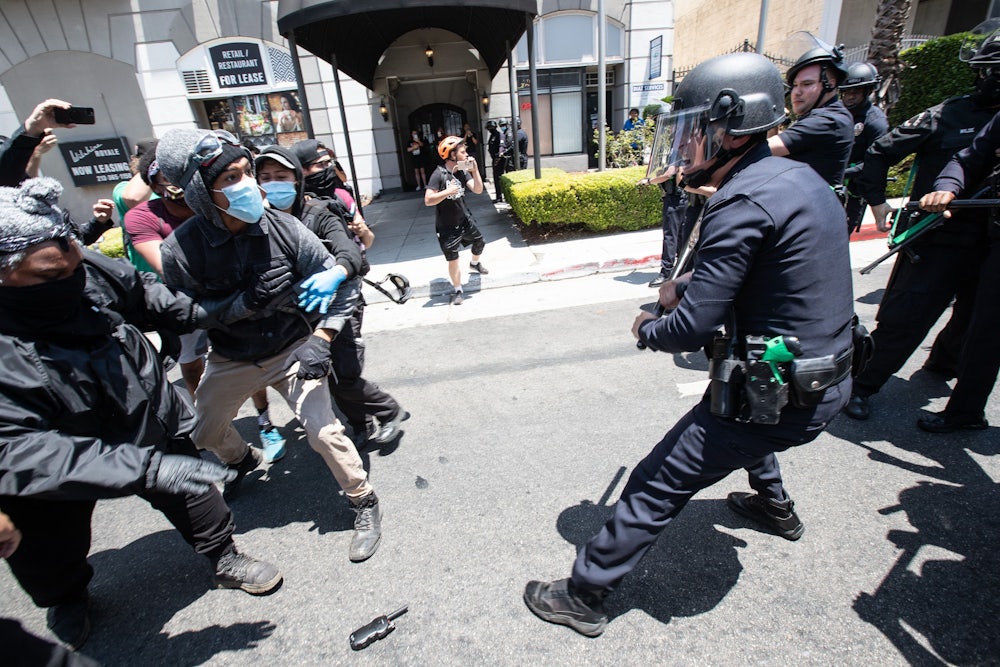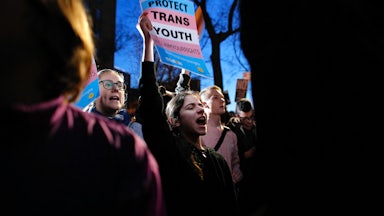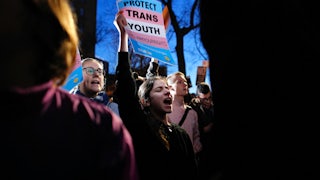The scene at Los Angeles’s Wi Spa on Saturday was disorienting: Anti-trans feminists carrying signs with slogans like “protect female spaces” mingled with QAnon adherents chanting “Save our children”; men in tactical gear and pro-Trump T-shirts stood ready for battle; while elsewhere in the crowd, suspected members and friends of the Proud Boys harassed journalists. What brought them all together was a story that had been spreading for weeks through the right-wing ecosystem, a viral outrage about something that may not have even happened: In June, a woman filmed herself confronting the spa’s staff, claiming that a person with a penis was in the women-only section of the spa and exposing themselves not only to adults but to children, a story lab-made to appeal to anti-trans sentiment and panic.
The video never shows the person meant to be its subject; according to a report in the Los Angeles Blade, police have found no corroborating witnesses. Still, the past two weeks have seen increasingly violent and escalating protests in front of the spa, another reminder of how effectively the right creates its own warped reality, one that often perpetuates real violence. The rapid spread of the Wi Spa story among different conservative factions also highlights another disturbing truth: Transphobia has proved to be a great unifier among the far right, anti-trans feminists, evangelical Christians, and a large chunk of Republican policymakers and voters. As the Southern Poverty Law Center’s senior analyst Cassie Miller told me recently, moral panics are remarkably effective at stitching together broad coalitions through hysterical threats, but generating new threats requires real targets. Once again, right-wing actors have given a myth material weight, one with dire consequences.
The story out of Wi Spa is a case study in how the right’s media and political ecosystems feed each other: On June 24, a woman who goes by the handle @cubanaangel on Instagram uploaded two videos that show her confronting employees and customers at the Koreatown bathhouse, which is known locally as a trans-affirming and LGBTQ-friendly space. “It’s OK for a man to go into the women’s section, show his penis around the other women, young little girls?” @cubanaangel asks an employee behind the counter at one point. Later in the video, when another spa-goer intervenes, asking her, “Are you talking about a transgender person?” her reply is, “There’s no such thing as transgender.” The person who posted the video, who in media appearances identifies herself only by the moniker Angel, and whose Instagram account is a mix of Christian affirmations and Bible verses, promises to conduct an exposé. “I am going to record this, because I’m gonna make a big deal, I’m going to take this very worldwide.” And she did.
Angel’s story was swiftly picked up by Ian Miles Cheong, the former Reddit moderator turned right-wing troll and commentator; a day later, Tucker Carlson joined in, devoting a segment of his Fox News show to Wi Spa. Shortly after Carlson’s segment, a flyer for the first protest, which billed itself as the “Wi Spa Anti-Pervert Protest,” began circulating online: “Women are being traumatized and Wi Spa is taking no action!” Dozens answered the call, with easily predictable and alarming results—at the first protest, held earlier this month, an anti-trans activist allegedly stabbed two people. Videos from the latest protest appear to show one right-wing protester macing a young girl, and a Guardian reporter on the scene was pushed to the ground as another protester, identified as a known associate of the Proud Boys, threw a water bottle at her. The LAPD officers on the scene, garbed in riot gear, targeted trans rights supporters and anti-fascist activists who showed up to counterprotest, beating at least one of them with batons, firing rubber bullets, and arresting 40 people. Afterward, according to Vice, people in a Telegram channel affiliated with the Proud Boys shared and applauded videos depicting officers arresting counterprotesters.
The fact that this violence was supposedly inspired by an event of which there’s little proof that it even happened is both illuminating and largely immaterial to those who have embraced the story as justification for their transphobia. The right-wing outrage machine has for years relied on the phantom threat that trans women supposedly pose to other women and girls to animate its attacks on trans rights, creating fictional realities that lead to very real threats. And in this instance, that finely calibrated outrage machine operated exactly as intended. But this sort of elevation is nothing new. The bat signal—as with QAnon, and Pizzagate, and so many other manufactured panics reliant on misinformation—worked again.
This convergence of forces is unsurprising to those who have been tracking how anti-trans sentiment has become central to right-wing movements, a spectrum that extends from the center of the Republican Party, which cloaks its attack on trans rights in shallow feminist language parroting the need to protect women and young children, to the far right, which embraces more direct violence. But if these groups’ rhetoric differs by degrees, their motivations are remarkably similar—a violent reinscription of an idealized, traditional idea of womanhood and the nuclear family, one that depends upon a rigid gender binary to maintain itself.
In 2019, the Southern Poverty Law Center noted that the far right was explicitly embracing transphobia, writing that “for far-right extremists, the increased visibility of transgender people is a sign of the growing ‘degeneracy’ of the nation, wrought by ‘cultural Marxists,’ leftists and Jews as part of an assault on white, Christian families and strict gender roles.” According to Miller, the author of the SPLC report, those attacks have ramped up: “Anti-trans activism now animates all parts of the political right, from Republican legislators to the organized white power movement.” In a recent report by the United Kingdom’s International Centre for the Study of Radicalisation on the evolution of far-right extremist groups in the United States, the authors noted that “transphobia has long been one of the most major and ubiquitous narratives around which the far right mobilizes.” Transphobia, it added, “should be recognised as a security concern” and as “one of the major and most ubiquitous narratives around which the far right as a broad movement recruits, mobilises and organises.”
We are likely to see what transpired at Wi Spa repeat itself in the coming months and years—imaginary threats generating real violence. Paranoid fantasy used to justify attacks on trans people, both in the streets and in legislative chambers. Republican elected officials may not be getting into fistfights with trans rights supporters, but one can almost guarantee they will, soon enough, point to Wi Spa as “proof” of the need for even more anti-trans legislation. Perhaps the only surprise is that it didn’t happen sooner.








